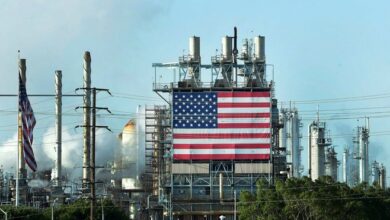Crude Oil Prices Experience Significant Decline Amid Concerns Over Weakening U.S. Demand

Prices Now at $90 Per Barrel
Crude oil prices witnessed a noticeable decrease during Tuesday’s trading sessions, driven by growing concerns over the potential weakening of U.S. demand for crude oil in the coming period. This concern escalated, especially after the global rating agency Moody’s issued a warning about the credit rating implications of a potential U.S. government shutdown, given that the United States is the world’s largest consumer of crude oil.
Current Oil Prices
During today’s standard oil futures trading, Brent crude contracts recorded a substantial drop of 0.74%, settling at $91.21 per barrel. Simultaneously, West Texas Intermediate (WTI) crude oil contracts remained stable at $88.99 per barrel but experienced a clear decline of 0.95%.
Why Did Crude Oil Prices Decline and Lose Their Benchmark Levels?
Crude oil prices declined during Tuesday’s trading, reaching $90 per barrel, coinciding with the prevailing apprehension about the potential weakening of U.S. oil demand. This concern arose after Moody’s, the global rating agency, warned that a government shutdown could harm the credit rating of the United States, the world’s largest consumer of crude oil. This warning came one month after another rating agency, Fitch, downgraded the U.S. government’s credit rating by one notch due to the debt ceiling crisis. This raised the possibility of weakening U.S. economic growth, causing a significant drop in oil prices during trading.
In this context, Moody’s stated that a potential government shutdown would be another indication of the political polarization in Washington regarding fiscal policy-making. This comes at a time when pressures on the U.S. government’s ability to bear debt are increasing due to rising interest rates and a widening fiscal deficit. These factors have raised speculations about a potential slowdown in U.S. economic growth, which, in turn, would lead to a reduction in crude oil demand, significantly impacting oil price movements.
Furthermore, statements from policymakers at most major central banks, particularly those favoring a hawkish monetary policy stance, have heightened concerns about the possibility of a global economic slowdown. This includes remarks from a Federal Reserve member, Kashkari, who expressed the possibility of the Federal Reserve raising interest rates again later this year, citing the need for further action regarding service price inflation. These statements indicate that a tight monetary policy may persist for longer than expected, which could, in turn, slow economic growth and curb demand for crude oil, putting significant downward pressure on oil prices.


